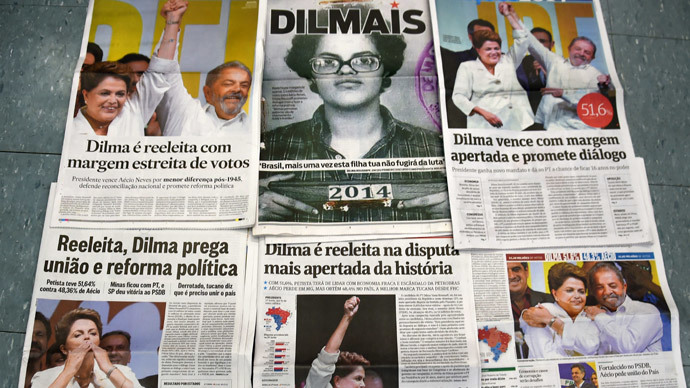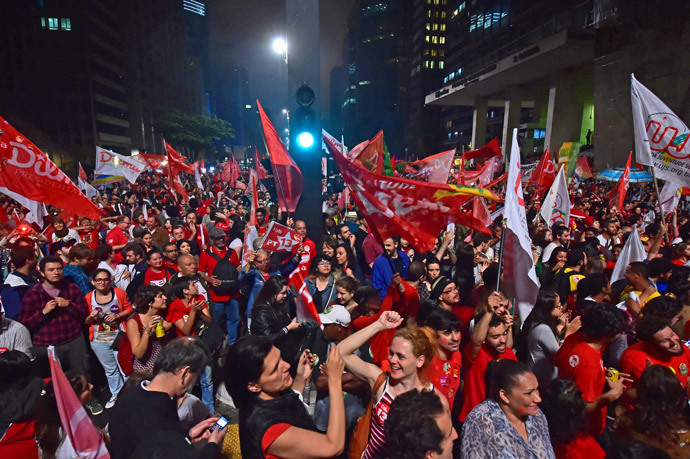Rousseff has ‘a very weak mandate’ after Brazil vote

Dilma Rousseff's second mandate will be challenging as Brazilian economy is bad and there is a lot of discontent among the population over corruption and uncertainty about the future, contributor to Bloomberg View Mac Margolis told RT.
RT:What does Rousseff's victory mean for Brazil? Does she now have a strong mandate to carry out reform or can we expect more of the same?
Mac Margolis: She has a very weak mandate; she comes out of this - very tight and bitterly-fought election- with a majority of less than four million votes out of 140 million. She won in one half of the country and lost in the other half, the latter being the wealthier part of Brazil. You can expect the second mandate to be quite challenging in a number of ways. The economy is bad, there is a lot of discontent in the street and, also, worry about where the country is going and corruption.
RT:Her party’s been in power for twelve years now and despite allegations of corruption and unrest they still won.
MM: Absolutely. Before the world cup, about 15 months ago, Dilma Rousseff was on an easy path to elections, scoring popularity rates of over 70 percent. Then protests ahead of the World Cup, a sudden and spontaneous explosion of millions in the streets hit her hard. She had to fight for her political life really. She had not one but two very tough rivals and came out of this by really by the skin of her teeth.
The discontent that is a sort of in abeyance hasn’t gone away, people still want to know which way she is going to take Brazil. It’s interesting that 70 percent of Brazilians consistently tell poll takers that they want deep changes in the country. So again, she has very thin mandate and a lot of problems ahead, not least governing her coalition partners, who sense her weakness and will want piece of flesh, if you will.
RT:Why was it so close?
MM: I think voters were looking for a change and they split the difference. Brazil is split in half, right down the middle. The vote was much closer than anybody, including the poll takers, imagined. You can make an argument that they decided on Rousseff basically because they were a little afraid of changes, not because they like where they are now, they are very aware of problems - unemployment although it has been low, is creeping up, inflation is high, growth is incredibly slow, Brazil is growing much slower than all of the BRICS. So I think they gave her the slight benefit of the doubt in a very lousy choice. There weren’t any heroes in these elections.
RT:How about Brazil's foreign policy? Will it continue to see itself as part of the BRICS? What impact will the outcome have on South America more widely?
MM: Good questions because foreign policy figured very low on both parties’ campaign agendas. There was a sense that if Aecio Neves, the social-democrat, was successful you’d see some crucial differences, definitive changes in foreign policy, perhaps less antagonism with the West, especially with Washington, and more openness to free trade.

Rousseff followed the line that her predecessor Luiz Inacio Lula da Silva did, who is a sort of political legend here, and befriended countries of the so-called South, the developing world, to the detriment in a way of the relations with the US. Rousseff is less interested in foreign policy, but I think she will follow Lula’s line. You’ll expect much more positive statements about Cuba, less criticism of the leftist government in Venezuela, no voice of criticism at all about China or Russia. So you have a status quo to remain the same foreign policy.
RT:The US has a huge influence in the region. Has its influence had an impact on this election? Some say the losing candidate was fairly pro-American in his outlook.
MM: The losing candidate was slightly more pro-American, but I wouldn’t want to exaggerate this. Rousseff fell out with the US last year when she discovered the NSA tapped her phone. It looks like that has blown over and the visit that she cancelled to Washington last year will probably be rescheduled for next year. Brazil cannot ignore the US, it is hugely influential here. No Latin American country can afford to.
There has been some antagonism but that’s part of the territory here, to be anti-US as to be Latin American in some way other. That will continue. I think, unfortunately, that puts Brazil a little bit behind the game in its own region because other countries have moved more aggressively, including embracing the US, and I’m talking about Peru, Mexico, Chili and Colombia, the so-called “Pacific alliance”, which is going great guns while the Brazil led-trade alliance - Mercosur - is not, it’s turning more into a political club. So I don’t think we are going to see great leaps and bounds on foreign policy either.
RT:Electronic vote counting was extremely effective and rapid. But have there been any cases of electoral fraud or vote rigging reported?
MM: Brazil has had some practice with electronic voting, for over ten years now. The results have been very swift and very rarely contested. They have some problems with voting machines, but no great claims of fraud, at least not yet. Less than 1 percent of voting machines had to be swapped either for other machines or for paper ballets. So it’s a pretty proven system. If the vote was tighter, maybe you would see some louder complaints about the system, but I think even though the vote was close it wasn’t tight enough to raise suspicion.
The statements, views and opinions expressed in this column are solely those of the author and do not necessarily represent those of RT.
The statements, views and opinions expressed in this column are solely those of the author and do not necessarily represent those of RT.












